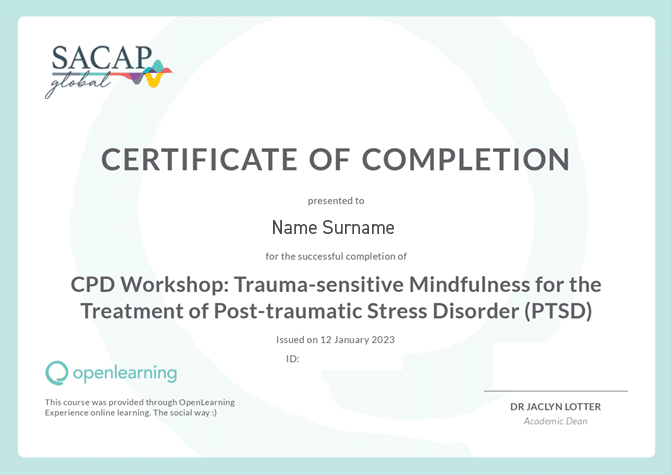Trauma-sensitive Mindfulness for the Treatment of Post-traumatic Stress Disorder (PTSD)
US$25.00

Take the Course
Trauma-sensitive Mindfulness for the Treatment of Post-traumatic Stress Disorder (PTSD)US$25.00
Details
Start Date
15 January 2024End Date
31 December 2024duration
3 hoursWorkshop Overview
The Trauma-sensitive Mindfulness for the Treatment of Post-traumatic Stress Disorder (PTSD) online workshop will equip psychologists with knowledge to understand the treatment of PTSD using Trauma-sensitive Mindfulness.
The CPD workshop examines Post-Traumatic Stress Disorder (PTSD) in the South African context.
Is this workshop for you?
This online workshop is for you if you are a psychologist.
Dates and Registration
Class of 2024: on demand
Participants can register at any time and move through the workshop content within 5 days. Watch the live workshop recording and complete the online journal articles and multiple-choice questionnaire.
Certification
This CPD workshop has been designed for psychologists to recognise and understand treatment of post-traumatic stress disorder (PTSD). Once you have completed the course, you will receive a digital certificate of completion.

The certificate serves as evidence of your new skills and knowledge and can be used to demonstrate your commitment to professional development.
Attend a live online session, or watch the recording, and complete an online reading and assessment.
HPCSA registered professionals will receive 3 CPD points [3 CEU Continuing Education Units points] upon successful completion of the workshop.
Workshop Overview
- Introduction: “The body keeps the score” by Bessel van der Kolk
- Understanding Trauma and Post-Traumatic Stress Disorder (PTSD), PTSD & the polyvagal theory
- Trauma-sensitive mindfulness (TSM) Buddhist Psychology: Suffering/PTSD and PTSD in the South African context
- PTSD in the global context – war-traumatised refugees
- Ethical considerations for cross-cultural application of interventions
- Trauma-informed practitioners: Professional training and qualifications
- Questions
Learning Outcomes
By the end of the workshop you will:
- Understand the impact of trauma on the individual.
- Build knowledge of the clinical picture of PTSD.
- Develop insight into the difference between trauma and PTSD.
- Develop awareness of the polyvagal theory.
- Understand Porge’s polyvagal theory and mindfulness.
- Explore Buddhist psychology and trauma-informed interventions.
- Develop insight into Buddhist psychology, PTSD and diversity.
- Understand what trauma-sensitive mindfulness is and how it works.
- Examine PTSD within the SA context.
- Explore the use of trauma-sensitive mindfulness for the treatment of Post-Traumatic Stress Disorder (PTSD) for war-traumatised refugees.
- Develop an understanding of ethical considerations for cross-cultural application of interventions.
- Learn about trauma-informed practitioners’ professional training and qualifications.
- Develop an understanding of Ethical considerations for cross cultural application of interventions.
- Learn about Trauma informed practitioners: Professional training and qualifications.
Workshop Presenter
Laila Jeebodh-Desai is an educational psychologist, lecturer and humanitarian. She works at St Peter’s College, where she provides psycho-educational assessments and therapeutic interventions. These interventions include mindfulness-based practices, narrative therapy, solution-focused brief therapy and other blended techniques.
Laila has been a practising lecturer at the South African College of Applied Psychology in Johannesburg since 2016. She has experience working with special needs children, many of which are diagnosed with Autism Spectrum Disorder (ASD), as well as Attention Deficit Hyperactivity Disorder (ADHD) and Pervasive Developmental Disorder (PDD).
She is a diverse South African female who is passionate about mindfulness practices. She is also a member of the Institute of Mindfulness in South Africa (IMISA).
Learner Experience

Understand the impact of trauma on the individual.
Explore Buddhist Psychology and trauma-informed interventions.
Develop an understanding of ethical considerations for cross-cultural application of interventions.
